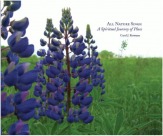When I heard these examples during writing workshops, I join the others in condemnation, knowing I would never stoop to such deceit just for the sake of story. However, after passing the warnings along to my own students, I remind them to “color” their scenes because description and dialog depend on telling things your characters would typically say and the clothes they might have worn or the cake they might have made for, let’s say, your tenth birthday. But to say that an incident happened when it did not—never!
I know the line and never thought I’d cross it. Until my own granddaughter, the now college senior who I supposedly taught to read at a young age, blew my cover. She, like her younger cousins, keyed in on her name in All Nature Sings. I had been very careful to avoid making the story about them but Lindsay found one incident that she questioned: a story about the legend of Chief Wabasis’ treasure.
The Chief, so the story goes, got a large financial settlement for his tribe from the US government but instead of sharing it, he buried it somewhere near Wabasis Lake. Several of our neighbors had been told, when they were youngsters, that the treasure just might be buried by our lake, Flat Iron. We passed the treasure story along to our own grandkids after we found Indian artifacts in our back yard. But I got carried away, stating “when the kids got restless, we’d tell them the story again and send them out with shovels to look for it. “Never happened!” said Lindsay, flatly. “If anyone would remember such a thing—it would be me.”
I could blame this stretch of story on my husband who loves to tell it to strangers and may have even added the shovel part, but that would be too much like that couple in the garden called Eden. I chose to write it in my book; I knew it was not true. I’m busted; I’m no better than a common liar who thinks she must stretch the facts for the sake of a good story. But worst of all, I felt no guilt until my own fact-checker caught me in the lie.

 RSS Feed
RSS Feed
